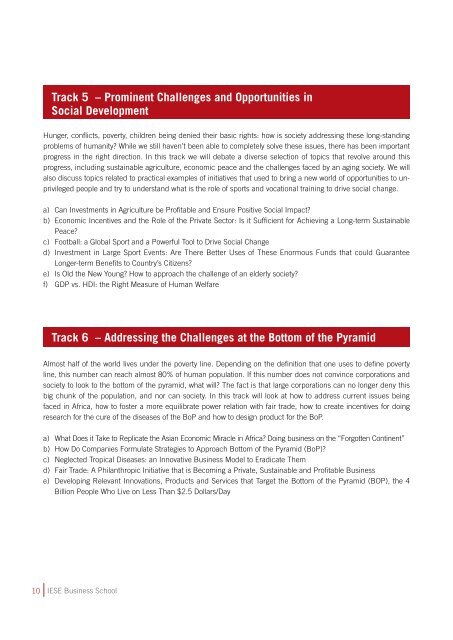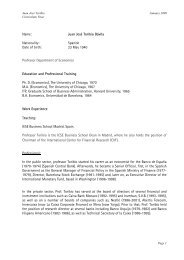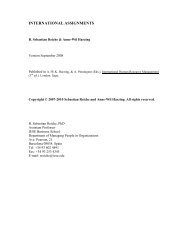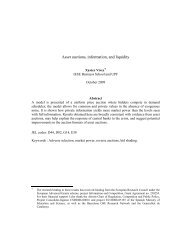Panel Speakers - IESE Blog Community - IESE Business School
Panel Speakers - IESE Blog Community - IESE Business School
Panel Speakers - IESE Blog Community - IESE Business School
Create successful ePaper yourself
Turn your PDF publications into a flip-book with our unique Google optimized e-Paper software.
10 <strong>IESE</strong> <strong>Business</strong> <strong>School</strong><br />
<strong>Panel</strong> Descriptions<br />
Track 5 – prominent Challenges and opportunities in<br />
Social Development<br />
Hunger, conflicts, poverty, children being denied their basic rights: how is society addressing these long-standing<br />
problems of humanity? While we still haven’t been able to completely solve these issues, there has been important<br />
progress in the right direction. In this track we will debate a diverse selection of topics that revolve around this<br />
progress, including sustainable agriculture, economic peace and the challenges faced by an aging society. We will<br />
also discuss topics related to practical examples of initiatives that used to bring a new world of opportunities to unprivileged<br />
people and try to understand what is the role of sports and vocational training to drive social change.<br />
a) Can Investments in Agriculture be Profitable and Ensure Positive Social Impact?<br />
b) Economic Incentives and the Role of the Private Sector: Is it Sufficient for Achieving a Long-term Sustainable<br />
Peace?<br />
c) Football: a Global Sport and a Powerful Tool to Drive Social Change<br />
d) Investment in Large Sport Events: Are There Better Uses of These Enormous Funds that could Guarantee<br />
Longer-term Benefits to Country’s Citizens?<br />
e) Is Old the New Young? How to approach the challenge of an elderly society?<br />
f) GDP vs. HDI: the Right Measure of Human Welfare<br />
Track 6 – addressing the Challenges at the bottom of the pyramid<br />
Almost half of the world lives under the poverty line. Depending on the definition that one uses to define poverty<br />
line, this number can reach almost 80% of human population. If this number does not convince corporations and<br />
society to look to the bottom of the pyramid, what will? The fact is that large corporations can no longer deny this<br />
big chunk of the population, and nor can society. In this track will look at how to address current issues being<br />
faced in Africa, how to foster a more equilibrate power relation with fair trade, how to create incentives for doing<br />
research for the cure of the diseases of the BoP and how to design product for the BoP.<br />
a) What Does it Take to Replicate the Asian Economic Miracle in Africa? Doing business on the “Forgotten Continent”<br />
b) How Do Companies Formulate Strategies to Approach Bottom of the Pyramid (BoP)?<br />
c) Neglected Tropical Diseases: an Innovative <strong>Business</strong> Model to Eradicate Them<br />
d) Fair Trade: A Philanthropic Initiative that is Becoming a Private, Sustainable and Profitable <strong>Business</strong><br />
e) Developing Relevant Innovations, Products and Services that Target the Bottom of the Pyramid (BOP), the 4<br />
Billion People Who Live on Less Than $2.5 Dollars/Day






